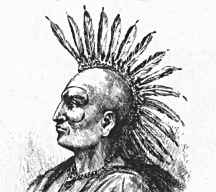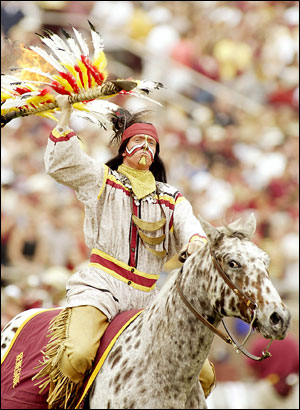 Another Stereotype of the Month entry:
Another Stereotype of the Month entry:
 Another Stereotype of the Month entry:
Another Stereotype of the Month entry:
Rob Daniels: Sponsored by debasing depictions
Somebody tell Chief Pontiac to retreat. He shouldn't have been summoned in the first place.
The NCAA had its heart in the right place. Unfortunately, it had already put its hand out in many of the wrong places before it decided to pick its most recent fight.
A month ago, the organization issued an edict banning schools from using Native American symbolism and nicknames on uniforms and other public devices during NCAA championships. The goal was to limit the prominence of potentially demeaning imagery.
If we can encourage the University of North Dakota to ditch the Fighting Sioux as its nickname, they reasoned, we can help chip away — not be confused with Chippewa — at the stereotypical, ignorant portrayals of Native Americans that infiltrate pop culture.
Excellent idea. Now go get some new "corporate partners" and "corporate champions."
As immediately and eloquently dissected by Jerry Palm on his indispensable Web site www.collegerpi.com, one of the three largest sponsors of CBS's NCAA tournament coverage is none other than Pontiac, the car brand once symbolized by a profile view of a Native American male not unlike the Washington Redskins' insignia. Today, the brand's logo is an arrowhead. Because, as we all know, when we think of the American Indian, the first things we should all think of are violence and weaponry.
Another of the NCAA's top-shelf sponsors is Coca-Cola, which lists Chippewa Water among its top brands. Chippewa Water comes from the Chippewa Valley of Wisconsin, or so they say. And the Chippewa Valley gets its name from the Native American tribe of the region.
You can't find any demeaning imagery on the bottles or logos of the water, which is nice. But neither can you find any such references on any of the 121 items officially licensed for sale by Central Michigan University on its athletics department's Web site. CMU's teams are the Chippewas, and the school is one of 18 on the NCAA's hit list for use of "hostile and abusive racial, ethnic or national origin mascots, nicknames or imagery."
Sixteen years ago, the school deleted such imagery from its logos and told the pep band to stop playing Native American drumbeats. No matter. They're targeted. Unlike Florida State, which has the cache of football excellence and the brother of the President of the United States living six blocks away, Central Michigan hasn't been able to get itself removed from the roll of ill repute.
One step below the "corporate champions" on the NCAA sponsorship mantle sit the "corporate partners," one of which is Kraft. And one of Kraft's many brands is Calumet Baking Powder, which has as its logo — surprise — a Native American in headdress.
A calumet is an elaborate pipe believed to have been first made by the Sioux and often used in political settings. Some historians refer to it as a "peace pipe."
Ponder for a moment what would happen if a Central Michigan cheerleader took out a "peace pipe" and started smoking during the NCAA tournament on CBS. Think there might be a problem?

In forging its corporate relationships, the NCAA did not intend to insult, demean or otherwise offend Native Americans. It took the money and didn't do a totally thorough investigation of what the contracts entailed in the public-relations department. Whenever you make a deal with a massive corporation such as Kraft, which has more subsidiaries than N.C. State has delusional football fans, you run the risk of an unholy alliance or 10.
But if you're going to stake out the moral high ground, you had better be sure it's free of weeds. Or you had better start digging.
Rob's reply
The NCAA's corporate partners are debasing Indians by selling products named after them? I don't think so.
In response to his editorial, I sent Daniels the following:
Rob,
Re http://www.news-record.com/apps/pbcs.dll/article?AID=/20050906/NEWSREC0105/509060311:
If I read your column write, you think the NCAA is debasing Indians with its corporate partners and products named after them. Not so.
The NCAA understands the problem of Indian mascots, but I'm not sure about you. You talk about the NCAA's partners who sell Pontiac cars, Chippewa Water, and Calumet Baking Powder. But Indians have rarely if ever protested their names used on hundreds of thousands of commercial products.
Why not? Because there's no apparent connection between cars, water, or baking powder and a harmful stereotype. You'd have to stretch your imagination to find a link between, say, a car's rugged power and an Indian's rugged power. The relationship between water or baking powder and Indians is even more tenuous.
Most people couldn't tell you that Pontiac was an esteemed Indian chief. They couldn't tell you that the Pontiac's logo is a stylized "arrowhead." They couldn't tell you anything about the Pontiac brand. If they make any connection at all, it's so subtle and elusive that it's barely worth mentioning.
You wrote that "when we think of the American Indian, the first things we should all think of are violence and weaponry." This is indeed the crux of the problem: that mascots encourage us to connect Indians with violence and weaponry. Indians aren't protesting any use of their names and terms, they're protesting such usage when it involves a harmful stereotype.
Cars, water, and baking powder don't qualify. Neither do state and other place names, another irrelevant point made by pro-mascot columnists. With their emphasis on warring and winning, sports teams do qualify. They're by far the most prominent example of a prejudicial Indian stereotype.

Many columnists scratched their head and wondered how the NCAA could criticize the mere use of Indian names such as "Seminole" and "Illini." That misreads the NCAA's conclusion. The NCAA didn't say such terms are offensive; it said the names, logos, and (most important) mascots create a hostile and abusive environment.
How so? Well, "Seminoles" creates a hostile environment when a warrior on horseback throwing a flaming spear encourages fans to think of Native people as savage, bloodthirsty killers. See Why FSU's Seminoles Aren't Okay for more on this point.
Most Indians weren't killers or even warriors. They definitely weren't spearchuckers a la the phony "Chief Osceola." So the warrior image is a stereotype and a false one at that. Opposing it isn't politically correct, it's historically and morally correct. It's correct, period.
Rob Schmidt
Publisher
PEACE PARTY
Related links
Team names and mascots
|
. . . |

|
All material © copyright its original owners, except where noted.
Original text and pictures © copyright 2007 by Robert Schmidt.
Copyrighted material is posted under the Fair Use provision of the Copyright Act,
which allows copying for nonprofit educational uses including criticism and commentary.
Comments sent to the publisher become the property of Blue Corn Comics
and may be used in other postings without permission.